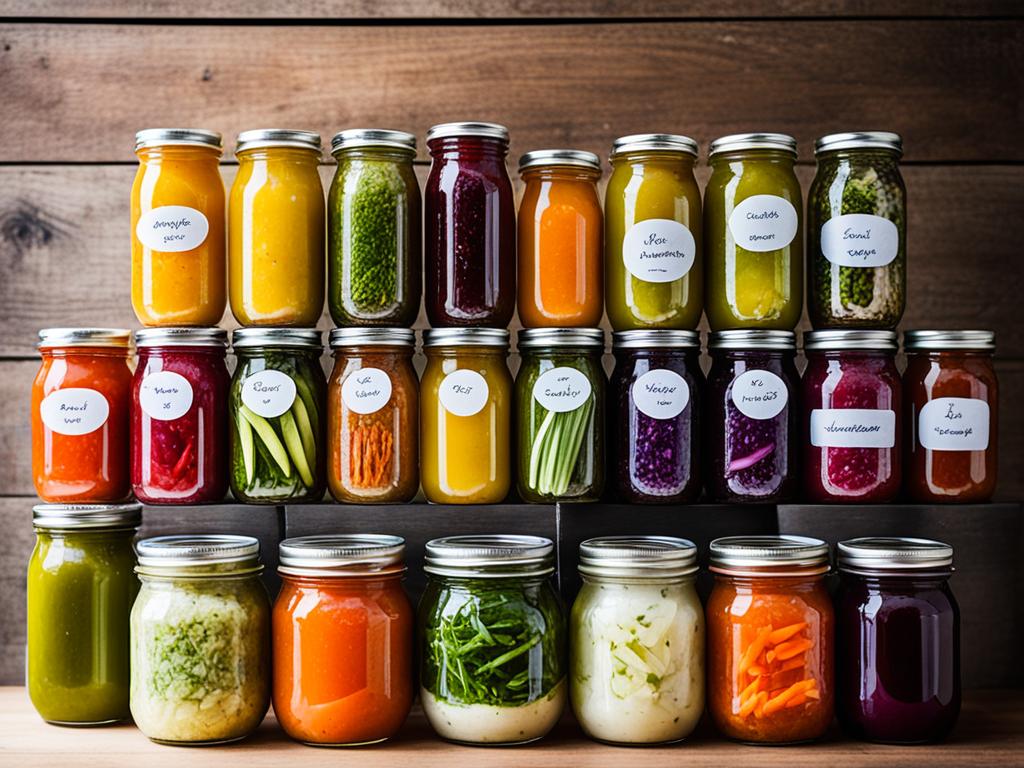Welcome to the fascinating world of fermented foods and beverages! In this article, we will explore the numerous health benefits they offer and provide you with some delightful recipes that will not only tantalize your taste buds but also enhance your overall well-being.
When it comes to fermented foods and beverages, you might be surprised to discover that they are more than just tasty treats. These traditional culinary delights have sparked a health revolution, gaining popularity for their exceptional health benefits, especially when it comes to improving gut health.
At the heart of fermented foods lies the power of probiotics. These beneficial microorganisms play a crucial role in maintaining a healthy gut. By incorporating fermented foods into your diet, you can introduce a diverse array of probiotics that can positively impact your gut health and overall digestion. Say goodbye to digestive woes and hello to a happier gut!
Key Takeaways:
- Fermented foods and beverages offer a variety of health benefits for enhancing overall well-being.
- Probiotics found in fermented foods are beneficial for gut health and digestion.
- Exploring the world of fermented foods allows you to experience a diverse range of flavors from different cultures.
- With DIY fermentation, you can create your own probiotic-rich foods at home.
- Incorporating fermented foods into your diet can be transformative for your overall health and vitality.
A Health Revolution
Fermented foods and beverages have sparked a health revolution that is sweeping the globe. With their exceptional health benefits, especially for gut health, these traditional foods are becoming increasingly popular choices for those seeking to improve their overall well-being.
What makes fermented foods so revolutionary? It all begins with their unique fermentation process. During fermentation, beneficial bacteria and yeasts break down carbohydrates and sugars in the food, creating a host of health-promoting compounds. These include probiotics, which are live microorganisms that are essential for a healthy gut.
The gut, often referred to as the “second brain,” plays a vital role in our overall health. It is home to trillions of microorganisms that make up the gut microbiome. This diverse ecosystem of bacteria, fungi, and other microbes has a profound impact on our immune system, digestion, nutrient absorption, and even our mood.
Research has shown that consuming fermented foods can help support a healthy gut microbiome by promoting the growth of beneficial bacteria and inhibiting the growth of harmful ones. This can lead to improved digestion, enhanced immune function, and a reduced risk of various digestive disorders. In fact, studies have linked a healthy gut microbiome to a wide range of health benefits, including better mental health, reduced inflammation, and even a stronger immune system.
The Key to Gut Health: Probiotics
At the heart of the health revolution brought about by fermented foods lies the powerful influence of probiotics. Probiotics are live microorganisms that, when consumed in adequate amounts, confer health benefits to the host. These beneficial bacteria and yeasts help restore balance in the gut microbiome, promoting optimal digestion, nutrient absorption, and overall well-being.
One of the primary sources of probiotics is fermented foods. From sauerkraut and kimchi to yogurt and kefir, these probiotic powerhouses provide a wide range of beneficial microorganisms that can support gut health. By incorporating fermented foods into your diet, you can introduce a diverse array of probiotics that can help maintain a healthy gut.
Furthermore, the health benefits of probiotics extend beyond gut health. Research suggests that probiotics may play a role in reducing the risk of allergies, improving skin health, and even enhancing mental well-being. The power of these microorganisms is truly remarkable, highlighting the potential of fermented foods in promoting holistic health.
With the health revolution fueled by fermented foods, it’s time to embrace these nutrient-rich and flavor-packed options. Whether you enjoy tangy sauerkraut, fizzy kombucha, or creamy yogurt, these traditional foods can contribute to your journey toward optimal well-being. So join the health revolution and incorporate fermented foods and beverages into your diet for a happier, healthier gut.
Probiotics and Gut Health: The Science Behind Fermented Foods
When it comes to maintaining a healthy gut, probiotics are the superheroes that come to the rescue. These beneficial microorganisms are essential for supporting digestion, nutrient absorption, and overall gut health. And where can you find a treasure trove of probiotics? That’s right, in fermented foods!
During the fermentation process, bacteria or yeast break down the carbohydrates in food, producing lactic acid. This increases the food’s acidity, creating the perfect environment for friendly bacteria to thrive. As a result, fermented foods like sauerkraut, yogurt, and kombucha become powerhouses of probiotics.
But what exactly do these probiotics do for your gut health? Let’s delve into the fascinating science behind it.
The Role of Probiotics
Probiotics are like the protectors of your gut. They help maintain a healthy balance of bacteria and keep harmful microorganisms in check. By bolstering your gut’s defense, probiotics play a crucial role in promoting good digestion, supporting immune function, and even influencing mental health.
One of the key benefits of probiotics is their ability to restore and maintain a diverse gut microbiota. A diverse gut microbiota refers to the presence of a wide variety of beneficial bacteria, which is associated with better overall health. It helps strengthen the gut barrier, prevent harmful bacteria from taking over, and reduce the risk of inflammatory bowel conditions.
Furthermore, probiotics improve the production of short-chain fatty acids (SCFAs) in the gut. SCFAs are byproducts of fermentation that provide nourishment to the cells lining your colon, supporting their health and integrity.
Fermented Foods: A Natural Source of Probiotics
Now that you understand the importance of probiotics, you can see why fermented foods are a valuable addition to your diet. They are a natural and delicious way to introduce these beneficial microorganisms to your gut and improve your overall well-being.
Probiotics in fermented foods are known to:
- Enhance digestion by increasing the production of digestive enzymes
- Boost nutrient absorption by breaking down complex compounds
- Support the immune system by regulating immune responses
- Reduce inflammation in the gut
- Promote mental wellness through the gut-brain axis
Did you know? The word “probiotic” actually comes from the Greek words “pro” (meaning “for”) and “biotic” (meaning “life”). It perfectly captures the essence of these beneficial bacteria that are essential for a healthy life.
By incorporating fermented foods into your daily routine, you can introduce a diverse array of probiotics to your gut, supporting optimal digestive function and overall well-being.
The Takeaway
The science is clear: probiotics are essential for maintaining a healthy gut, and fermented foods are an excellent natural source of these beneficial microorganisms. By understanding the role of probiotics and their benefits for gut health, you can make informed choices to support your well-being.
From Kimchi to Kombucha: Fermented Foods Around the World
Fermented foods are a culinary delight that transcends borders. Each culture presents its own unique twist on fermentation, resulting in a diverse array of flavors and textures that captivate taste buds around the world. Let’s explore two popular examples – Kimchi and Kombucha.
Kimchi: Spicy, Tangy, and Gut-Friendly
Originating from Korea, Kimchi is a fiery concoction of fermented vegetables. The star ingredient, usually cabbage or radishes, is marinated in a robust blend of chili pepper, garlic, ginger, and other seasonings. Once fermented, it transforms into a tangy, piquant delight that enlivens any dish.
Kimchi is a probiotic powerhouse, teeming with beneficial bacteria that support a healthy gut. Its unique blend of flavors adds a burst of complexity to rice bowls, stews, and even wraps. Embrace the Korean tradition and introduce the vibrant flavors of Kimchi into your culinary repertoire.
Kombucha: A Refreshing Elixir
Kombucha has gained popularity worldwide as a refreshing and effervescent beverage. Made by fermenting sweetened tea with a symbiotic culture of bacteria and yeast (SCOBY), Kombucha offers a delightful combination of flavors – sweet, tangy, and slightly acidic.
The fermentation process converts the sugar in Kombucha into beneficial organic acids and probiotics. This tangy elixir not only quenches your thirst but also supports digestion and boosts your immune system. Sip on a glass of homemade or store-bought Kombucha and let its zesty charm captivate your taste buds.
As you indulge in the diverse world of fermented foods, embrace the rich cultural heritage behind each delicacy. Whether it’s the spiciness of Kimchi or the refreshing fizz of Kombucha, fermented foods offer a journey of flavors that nourish your body and delight your senses.
| Fermented Food | Country of Origin | Flavor Profile |
|---|---|---|
| Kimchi | Korea | Spicy, tangy |
| Kombucha | China | Sweet, tangy, fizzy |
DIY Fermentation
Ready to embark on the exciting journey of DIY fermentation? Whether you’re a beginner or a seasoned enthusiast, we’ve got you covered with some easy-to-follow techniques and delicious fermented recipes. By fermenting your own foods and beverages at home, you can take control of your health and explore a world of vibrant flavors.
Fermentation is a simple and ancient preservation technique that not only extends the shelf life of foods but also enhances their nutritional value. With just a few basic ingredients and equipment, you can create your own probiotic-rich delicacies right in your kitchen.
Getting Started: The Basics of DIY Fermentation
If you’re new to DIY fermentation, it’s essential to start with the fundamentals. Here are the key steps to kickstart your fermentation journey:
- Choose your ingredients: Select fresh, high-quality produce for fermentation. Vegetables like cabbage, carrots, and cucumbers are popular choices, but you can also experiment with fruits, herbs, and even tea leaves for kombucha.
- Prepare your equipment: Cleanliness is crucial in fermentation. Ensure your jars, lids, and utensils are thoroughly cleaned with hot, soapy water to prevent any unwanted bacteria or mold.
- Brine or salt your ingredients: Create a brine or sprinkle salt over your ingredients to draw out their natural juices and create an environment that inhibits harmful bacteria while encouraging lactic acid fermentation.
- Pack it tightly: Press your ingredients firmly into the fermentation vessel, removing any trapped air to facilitate anaerobic fermentation.
- Set it aside: Seal the vessel and let it sit at room temperature for the fermentation process to occur. The time required can vary depending on the recipe and your desired flavor profile.
- Taste and enjoy: Once the fermentation is complete, taste your creation to determine if it has reached the desired tanginess and texture. Transfer it to the refrigerator to slow down the fermentation process and enjoy it at your leisure.
Delicious Fermented Recipes to Try
Ready to put your DIY fermentation skills to the test? Here are a few mouthwatering recipes to inspire your culinary experiments:
| Recipe | Ingredients | Instructions |
|---|---|---|
| Sauerkraut | Cabbage, salt | Chop the cabbage, mix with salt, and pack tightly into a jar. Leave to ferment for 1-2 weeks, then refrigerate. |
| Kombucha | Tea, sugar, SCOBY | Brew a batch of sweet tea, let it cool, and add the SCOBY. Cover with a cloth and ferment for 7-14 days. Strain, bottle, and enjoy! |
| Kimchi | Napa cabbage, radish, red pepper flakes, garlic, ginger | Slice the cabbage, mix with other ingredients, and massage until juicy. Pack into a jar, leaving space at the top. Ferment for 3-7 days, then refrigerate. |
Feel free to customize these recipes according to your taste preferences by experimenting with different spices, herbs, and additions. The possibilities are endless when it comes to DIY fermentation!
With some patience and a touch of creativity, you can master the art of DIY fermentation. By incorporating these probiotic-rich foods into your diet, you’ll not only support your gut health but also discover a whole new world of flavors and textures. So, roll up your sleeves, gather your ingredients, and let’s get fermenting!
Conclusion
After exploring the health benefits, global diversity, and DIY possibilities of fermented foods and beverages, it’s evident that they offer a wealth of advantages for your well-being. Incorporating these nutritious and flavorful options into your diet can have a transformative effect on your health.
Fermented foods and beverages are packed with beneficial probiotics that support a healthy gut and bolster your immune system. These amazing microorganisms aid in digestion, improve nutrient absorption, and promote overall gut health, contributing to a stronger immune response. By incorporating fermented foods and beverages into your daily routine, you can take proactive steps to support your body’s natural defense system.
Furthermore, the global array of fermented foods and beverages ensures that there is something for everyone to enjoy. From the tangy and spicy flavors of traditional Korean kimchi to the refreshing fizziness of kombucha, exploring these diverse culinary delights adds excitement and variety to your meals. Whether you are looking to expand your palate or indulge in a centuries-old favorite, fermented foods and beverages offer a world of flavors to explore.
Ready to embark on your fermentation journey? Harness the power of DIY fermentation and experiment with your own unique creations. From sauerkraut to kefir, the possibilities are endless. By fermenting your own foods and beverages, you can control the ingredients, flavors, and fermentation time, creating personalized recipes that suit your taste and dietary preferences. Unleash your creativity and reap the rewards of homemade fermented treats.







